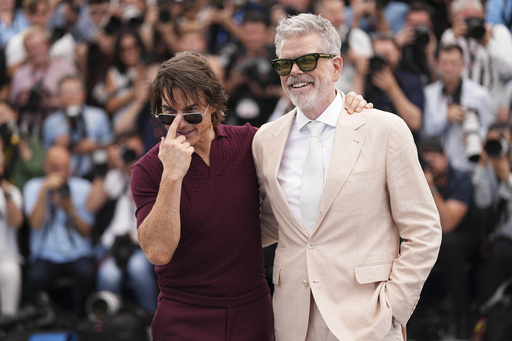CANNES, France — The Cannes Film Festival is nearing its conclusion, but this year’s event has captured significant attention from the outset. From new regulations on its red carpets to concerns about potential U.S. tariffs and the much-anticipated return of Tom Cruise, the festival has been nothing short of eventful. Not to mention the slate of films being showcased, which have become increasingly pivotal for Oscar best picture considerations. As the festival winds down today, it’s apparent that the films of this year are engaging with themes of geopolitical tension, climate change, and various social issues that parallel real-world events.
Even in a regular year, keeping up with Cannes is a daunting task. Here’s a breakdown of recent happenings, what remains, and potential implications.
Recent Events at Cannes
Monday saw unexpected developments courtesy of Spike Lee’s film “Highest 2 Lowest.” Denzel Washington was granted an honorary Palme d’Or, marking a whirlwind visit to Cannes amid his busy Broadway schedule starring in “Othello.” Another surprise followed the premiere when Rihanna graced the red carpet accompanying A$AP Rocky, who features in the film.
Lee discussed with reporters how “Highest 2 Lowest,” a tribute to an Akira Kurosawa film, retains his distinctive style while connecting to the original. Recalling how his mother took him to see musicals, he said, “The Sound of Music” was among them. Comparing his film to Coltrane’s rendition of “My Favorite Things,” he highlighted this innovative approach.
A standout reception occurred Wednesday for Joachim Trier’s “Sentimental Value.” Starring Renate Reinsve, Stellan Skarsgård, and Elle Fanning, the film is Trier’s sequel to 2021’s “The Worst Person in the World.” Predicting the Palme d’Or winner is rarely straightforward, but should “Sentimental Value” win, it would be a historic first for a Norwegian film.
Iranian filmmaker Jafar Panahi introduced his latest work, “It Was Just an Accident” — a significant accomplishment given his history, including years of imprisonment that have kept him from attending the festival with his films. Panahi commented on the importance of having his film present, stating that it supersedes his personal attendance.
Scarlett Johansson, fresh from hosting “Saturday Night Live,” debuted as a director with “Eleanor the Great” in the Un Certain Regard section. Set in New York, the film humorously and tenderly portrays a woman, played by June Squibb, who appropriates her deceased friend’s story of surviving the Holocaust.
As the week continued, many stars attending Cannes participated in the amfAR gala to support AIDS research and prevention, with auction items including cameos in Lee’s next movie and art by James Franco and Adrien Brody.
Standout Moments from Cannes
Cannes began with a tribute to Robert De Niro, celebrating 49 years since “Taxi Driver” won the festival’s top honor, the Palme d’Or. De Niro seized this opportunity to criticize U.S. President Donald Trump, alongside appreciation from cinematic greats like Leonardo DiCaprio and Quentin Tarantino.
The festival also premiered a restored version of “The Gold Rush,” Charlie Chaplin’s classic, commemorating its centennial. “Our grandfather would be very proud to see this,” remarked Kiera Chaplin during a packed screening.
Tom Cruise was a highlight on Day 2 with the new “Mission: Impossible” film, “Final Reckoning.” Unlike previous extravagant spectacles, Cruise opted for a grounded entrance, reflective of a more restrained Cannes.
News later broke of Cannes prohibiting French actor Théo Navarro-Mussy from attending the premiere of “Case 137” amid rape allegations—an unprecedented decision for the festival in the #MeToo era.
Bono unveiled his documentary “Bono: Stories of Surrender,” engaging in conversations about insights gained from the project, including his relationship with his late father and opinions on the dismantling of international aid efforts.
During the weekend, Richard Linklater’s latest film, “Nouvelle Vague,” received positive reviews, as did Jennifer Lawrence’s performance in Lynne Ramsay’s “Die, My Love,” which is already generating Oscar buzz. Kristen Stewart presented her directorial debut, “The Chronology of Water,” challenging the notion that directing requires specialized skills. “It’s a myth that you need extraordinary tools or credentials,” she stated.
“My Father’s Shadow” marked a historic moment as the first Nigerian film selected for the festival’s Un Certain Regard section. Akinola Davies Jr., the director, commented on its significance for Nigerian storytelling and industry presence on the global stage.
New Red Carpet Rules and Celebrity Reactions
One of Cannes’ notable changes this year included banning nudity on the red carpet and restricting “voluminous” outfits, notably those with large trains. In response to the “naked dress” trend seen at various Hollywood events, Cannes reiterated long-standing rules now clearly articulated in its charter.
Halle Berry, part of the festival’s jury headed by Juliette Binoche, announced she would adhere to the rules, opting for a revised opening night attire. While daring looks have been few, several strikingly large dresses were showcased by stars like Heidi Klum and Chinese actor Wan QianHui.
What could be the next red carpet ban? Possibly costumes resembling birds, as one attendee in a bird outfit made an appearance at the “Die, My Love” premiere, sans wing-flapping for photographs.



